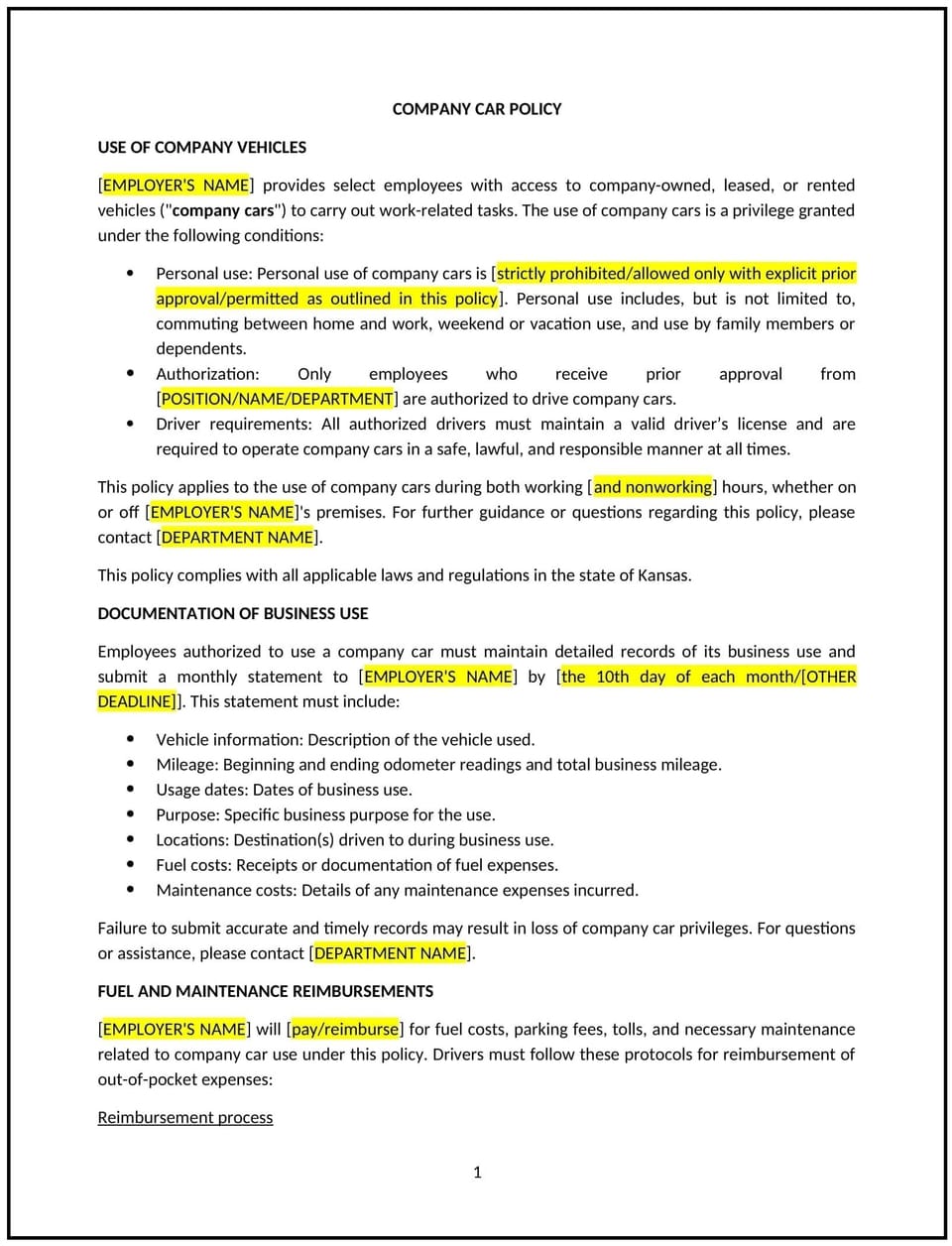Company car policy (Kansas): Free template

Company car policy (Kansas)
A company car policy helps Kansas businesses establish guidelines for employees who use company-provided vehicles for work-related travel. This policy outlines eligibility, usage rules, maintenance expectations, and responsibilities to ensure safe and efficient vehicle operation.
By implementing this policy, businesses can promote responsible vehicle use, reduce risks, and manage transportation resources effectively.
How to use this company car policy (Kansas)
- Define eligibility requirements: Businesses should specify which employees qualify for a company car, such as job roles that require frequent travel or specific operational needs.
- Outline permitted use: Businesses should clarify whether vehicles are for business purposes only or if limited personal use is allowed, along with any restrictions.
- Set driver responsibilities: Employees should follow all traffic laws, maintain valid driver’s licenses, and report any accidents or violations promptly.
- Establish maintenance expectations: Businesses should outline who is responsible for vehicle upkeep, including regular inspections, fuel usage, and servicing requirements.
- Address insurance and liability: Businesses should provide details on coverage, including who is responsible for damages, deductibles, and reporting claims.
- Implement mileage and fuel tracking: Businesses should require employees to log mileage and fuel expenses for accurate record-keeping and reimbursement, if applicable.
- Review and update regularly: Businesses should periodically assess the policy to reflect changes in company needs, vehicle availability, and safety regulations.
Benefits of using a company car policy (Kansas)
- Promotes safe vehicle use: Establishes guidelines for responsible driving and accident prevention.
- Reduces business liability: Helps manage risks related to vehicle use and legal responsibilities.
- Improves cost management: Provides structure for fuel usage, maintenance, and overall vehicle expenses.
- Clarifies employee expectations: Ensures that all employees understand usage rules and reporting requirements.
- Supports operational efficiency: Helps businesses allocate vehicles effectively for job-related travel.
- Enhances vehicle longevity: Encourages proper care and maintenance to extend the lifespan of company cars.
Tips for using this company car policy (Kansas)
- Communicate usage rules clearly: Businesses should ensure employees understand when and how company vehicles may be used.
- Require regular vehicle inspections: Employees should check company cars for safety issues before use and report any maintenance concerns.
- Establish clear reporting procedures: Businesses should require prompt reporting of accidents, tickets, or mechanical problems.
- Monitor mileage and expenses: Businesses should track vehicle usage to control costs and prevent misuse.
- Enforce consequences for violations: Businesses should define disciplinary measures for misuse of company vehicles.
- Adapt policies to business needs: Businesses should review vehicle use trends and adjust policies as necessary.
Q: Why should Kansas businesses implement a company car policy?
A: Businesses should implement a company car policy to establish clear usage guidelines, manage risks, and ensure employees operate vehicles responsibly.
Q: Who should qualify for a company car?
A: Businesses should determine eligibility based on job responsibilities, travel frequency, and operational needs. Positions requiring frequent off-site meetings or deliveries often qualify.
Q: Can employees use company cars for personal purposes?
A: Businesses should specify whether limited personal use is allowed or if vehicles are strictly for work-related travel. If permitted, usage guidelines should be clearly defined.
Q: How should businesses handle company car maintenance?
A: Businesses should establish maintenance schedules and require employees to report issues. Responsibilities for fueling, inspections, and servicing should be clearly outlined.
Q: What should employees do if they receive a traffic violation while driving a company car?
A: Employees should report traffic violations to management immediately. Businesses should determine whether the employee or company is responsible for fines and penalties.
Q: What happens if an employee is involved in an accident while driving a company car?
A: Businesses should require employees to report accidents immediately, follow local accident procedures, and document all details for insurance and liability purposes.
Q: How often should businesses review and update their company car policy?
A: Businesses should review their policy annually or whenever there are changes in vehicle availability, safety regulations, or business needs.
This article contains general legal information and does not contain legal advice. Cobrief is not a law firm or a substitute for an attorney or law firm. The law is complex and changes often. For legal advice, please ask a lawyer.


